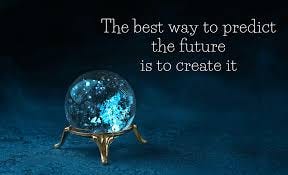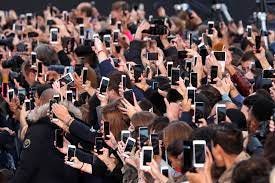How Do We Create a Post Social-Media Society? What Would It Look Like?
The future isn't as simple as “Cyberpunk” vs “Return to Monke." Given the current dissatisfaction with our social-media dominated economy and culture, change will come. But How?
If you’ve read the headlines lately, you will get the feeling that society is becoming more and more technical, that AI is swiftly taking over, and we are headed towards an automated future. You will learn about how traditional channels of marketing and communication have been outpaced by social media. And of course there’s plenty of truth to this, but its also obscuring another very real trend - general dissatisfaction with our social media driven culture and society. As AI continues to take over the online world, the desire for alternatives will only grow. I have written about this in other articles, such as this one. https://theyoufrontier.substack.com/p/now-that-the-internet-is-dead-its
But today, I want to talk about something else: About what a post-social media society might in fact look like. If you’re reading this today (which you probably are, unless you can time travel), a post-social media society might seem almost impossible to picture. The only thing that would come to our mind would be a pre-social media society, a memory of life from 1999 or maybe 2003, before Facebook, Twitter and TikTok were known by anyone, before smartphones were connected to our pockets 16 hours a day. Maybe we think of the Amish, or some remote tribe in the Amazon, and their ultra-traditionalist way of life. But believe it or not, we don’t need to choose between a Cyberpunk future or a “Return to Monke.” We can have control over technology, and control over our lives. It won’t be easy to achieve, but it is possible to move on from the current social media ecosystem without completely returning to monke. The first step will be to change our relationship with technology. We have to stop treating it as an idol to bow down to, and start treating it the way our ancestors treated their technology: as a tool. A valuable, useful tool, but still a tool. The caveman toolmakers didn’t spend most of their time trying to replace their cooking stick with the iStick 16 in order to sell recurring models of their sticks, but rather how to refine their tools to better suit its function. Marketing and selling existed then just as it does now - ancient artisans had to learn how to value and sell their products. But because of technological limitations, they were not worried about how to scale production so that society could be centered around increasing pottery sales. Today’s tech leaders are either directly or passively looking to improve their products in a way that makes society more reliant on them, and this is different from most other products and industries throughout history in a way that merely mentioning the effects of “capitalism” can’t explain. When some of the most intelligent engineers are getting paid six and seven figure salaries in order to increase algorithmic “engagement” by seven percent, the result is a society that is more addicted to consuming such products, but not actually more well-informed or connected. It’s more like consuming opium rather than pottery, swords, or cooking tools. So with all that said, the first step towards creating a society where social media has minimal importance is to understand the nature of the problem, and whether through regulation and / or our own consumer action, to reduce our reliance on this digital drug.
On that note, we need to limit the power of our wannabe robot overlords in Silicon Valley, the people who want to use their technological innovations to drain us of data, income, and personal time with each other. We need to wrestle control of advanced technology away from the Mark Zuckerberg’s, Peter Thiel’s and Elon Musk’s of the world, and invest in small businesses and communities that want to have some say over how we use powerful technology such as AI. But while regulation can be effective and much-needed, we need to build our own appealing and affordable alternatives. We need to create content that is more rewarding than Insta reels, community centers, and “third places” that are far more connecting than friend requests on Facebook, and have a culture more cool and meaningful than the TikTok algorithm. We need to make sure the real world is not too hard or unaffordable for the average person to access.
Technology and technological innovation long predates social media. In fact, so does the World Wide Web, better known today as the Internet. A post-social media society can still have high-tech labs and scientific research, it can still have an Internet and online content, from music to memes and marketing. But instead of having to go through a centralized platform, it can be more direct just like the blogs here on Substack, or the old Internet blogspots. It can still have forums and hubs for discussion and shopping. What it can’t have is a centralized secret algorithm meant to monitor data. It’s these algorithms, combined with the ad revenue incentives that have made social media deteriorate into what its become in recent years. TikTok seemingly perfected this algorithm, and the other social media companies have rushed to catch up to the point where the distinction between TikTok and Instagram is essentially meaningless.
My opinions on social media, and desire for a post social media future aren’t unique to me. I happen to know a lot about the topic, but a majority of Americans, and likely, people around the globe, are sick of the status quo. A Pew Research Poll from 2020 shows that 64% of Americans say that social media has a “negative effect on the way things are going in the country” compared to just 10% who said it has a positive effect. Majorities of teenagers and young adults, who have grown up with social media their entire lives, say that social media has a negative effect on their mental health, and that they have experienced cyberbullying of some kind on these sites. The average teenager today spends a whopping 4.8 hours a day on social media, and this is even higher among teen girls, who suffer record rates of anxiety and mental health issues. I could go into more stats (I’ve done so before) - but there is tons and tons of data out there that tells the same story. Most people who use social media increasingly despise it, they just can’t see any alternatives. This is especially the case for the teenagers and 20 somethings who have spent most of their lives trapped in the bubbles presented to them by the algorithms, and they’re yearning for something better and freer. We can’t just complain about it. We have to work to create something better. We need to use our creativity and imagination to build a post-social media future. I believe we will get there someday, and while I have some ideas for what it might look like, ultimately it will be up to all of you!







